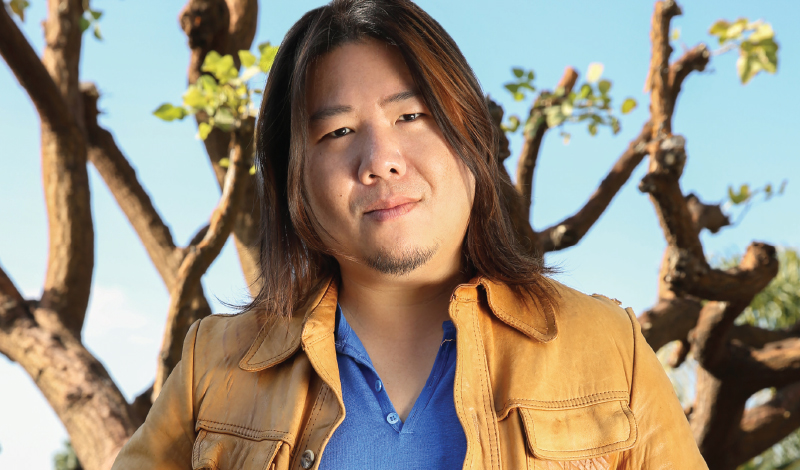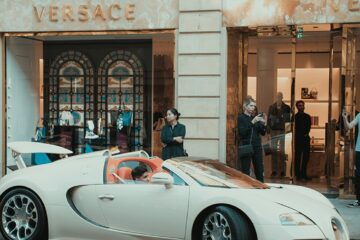Kevin Kwan: Crazy Rich Asians
The film adaptation of Kevin Kwan’s national bestselling book, Crazy Rich Asians, is set to hit theatres everywhere in 2018. Dolce sits down with Kwan to discuss the Far East, whose wealth and class systems and cultural dynamics, such as fashion and marriage, he describes in his book.
The world is now well-versed in the financial might of China. Chinese tourists have been flocking to international capitals with high spending power. Nevertheless, Westerners are not necessarily familiar with the idea of Asians having vast wealth. Call it a bias from Hollywood or maybe some leftover unconscious racism, but there isn’t a great familiarity with Asia’s new class of super rich. Kevin Kwan intends to change this. His novel, Crazy Rich Asians, already a hit in 2014, was followed up by the sequel China Rich Girlfriend. Setting his sights even higher, Kwan is executive producer of the movie adaptation of his first novel, to be released by Warner Brothers in 2018 with an all-Asian cast. Times are definitely changing, so we sat down with Kevin Kwan at a posh Beverly Hills hotel to get to know the new trends among Asia’s mega-rich class.
DOLCE MAG: In countries like Japan, Korea and Taiwan, there is a large middle class and a very homogenous society. What is the role of class in societies like Hong Kong and Singapore?
KEVIN KWAN: What they have in common are their colonial pasts. They were both British Crown colonies. I think that kind of affects the class system in a way. There is this very interesting demarcation between the classes. It’s a bit more obvious than in Taiwan, Korea or Japan. In those countries, people are company men. It is very upper-middle class. You work for a great corporation. Your life is your career. The focus is different. Whereas Hong Kong is all about prestige and wealth — it’s very “blingy.” Because [Singapore and Hong Kong] are both tiny islands, everyone’s obsessed with real estate and acquiring wealth. The land is so valuable. It’s also a distinguishing characteristic, the fact that they’re tiny islands.
DM: Was your book intended for a Western audience that is not necessarily familiar with Asia?
KK: Very much so. It’s one of the reasons I started to write the book. I just felt there’s such a disconnect between the Asia I knew and what was being reported in the press in the U.S. If you went into a bookstore, there really was no fiction on contemporary Asia. There was a lot of fiction on historical Asia, Shanghai, World War II and so on. There was ancient-Asia fiction. There was fiction based on the Asian-American experience. But there was nothing about what was happening right now, the economic boom that has lasted for three decades now. I wanted to set the book in that world, to show the reality behind the economic reports.
DM: Did you travel to write the book?
KK: Mainly to Hong Kong and China. I went to the places I didn’t know as well.
DM: What is the role of money in your books? I see family as being a central theme, but I wonder if the same story could be transposed to an average-wealth family?
KK: I don’t think so at all. It’s the money that really intensifies the drama and complicates the lives of these people. I wanted to show what’s behind the curtain of having extreme wealth, and the interesting problems it brings up. I think wealth cultures around the world are very different. For example, the way Americans use their money is very different from how Hong Kongese, Singaporean and mainland Chinese deploy their wealth.
DM: How would you characterize the difference between old money in Hong Kong and Singapore and nouveau riche in China?
KK: I think everyone is different in how they treat their money, in how they spend, how they behave, so I don’t want to overgeneralize, but I would say what’s happening in China now is fascinating to me. I explore that a lot, especially in book two, China Rich Girlfriend. You have a country where there was austerity, they weren’t spending money, they didn’t have money, and then over the past 30 years a lot of families have done incredibly well.
DM: Even in the past 20 years only.
KK: Or you could say the past 10 years. It depends. There’s “old” money there that’s only 30 years old! But there’s also a lot of new money. Everyone’s treating it very differently. To me there are fewer rules in China, in a kind of strange way. It’s kind of this open territory. They’re reinventing their culture; they’re reinventing their relationship to money. And so, yes, you have these people who are completely blank, love to show off, love to Instagram, love their fortunes and pictures of themselves with piles of cash. You have that, but you also have people who are extremely discreet, extremely secretive and extremely private so, really, it runs the gamut. To me, there is a freedom there in how they express and explore their money that is much more “no holds barred” than in Singapore and HK, where the rules have been set; they’ve been set for a hundred years now, and if you want to be in the “A game” and a part of high society, you have to play by a set of very specific chess moves. Whereas China — it’s a much larger country and much more diverse population. It’s really anyone’s game.
DM: The laws in China are even more limiting because you can’t buy several properties in the same city under your own name. So they buy for their kids or in another city, but no one owns three apartments in one neighbourhood. That’s not possible … at least not in their own name.
KK: Yes, exactly. Totally. I think it’s very interesting how a lot of the Chinese money, because of all the rules, has become very “international,” in a way that’s not true for a lot of wealthy Singaporeans and HK residents, where a lot of the wealth is very centralized in their home countries.
DM: Well, maybe it’s because of the stability that they feel surer things will still be the same in 10 to 20 years, which isn’t really true for China right now. There’s not the long-term vision yet, and I’m not sure it will happen. Even where I live, you don’t see a lot of wealthy Singaporeans buying property; it’s mostly Chinese.
KK: Yes, exactly, and mainland Chinese. In New York, L.A., all over the world, they’re putting their “stamp.”
“I wanted to show what’s behind the curtain of having extreme wealth and the interesting problems it brings up”
DM: Going back to your point about “no rules,” I’ve seen a mix of what you were saying. There are people who spend their money on something predictable like a fancy car, a Lambo or a Ferrari or a Maserati, but in their daily life, maybe they don’t know about designer fashion — so he’s totally dressed down, like he bought his stuff at Ross or something!
KK: [Laughs] Yes! And he might not care! He wants to spend half a million dollars on a stereo system and that’s all he cares about.
DM: Yes, exactly! There’s a mix, whereas in Hong Kong, it’s wealth and high-end spending across the board; everything is expensive. In China, they have a partial wealthy lifestyle. I think it’s also that some of their friends or wives’ friends haven’t made it to that level yet and they can’t go all “blinged out” since it’s not really in the culture. We’re talking about nouveaux riches who have been around for only about 20 years or so, and they weren’t raised rich. It’s fascinating to see. It’s not yet a completely separate class; it’s too new. The money is there, but it’s not really in the culture. It’s complicated, because it’s very flashy in some aspects, but not in others. Your book does express that if you’ve got it, you’re going to flaunt it …
KK: I mean … it’s specific to the character. Not Rachel or Nick, but Eddie does. The cousin is from HK and he likes to show off. I have a lot of fun with this snobbery. It shows the diversity of how different people like to show off their wealth.
DM: I think it was in The New York Times that they said, “These people have no shame!” or something along those lines, and it was really interesting to me because I don’t think there is anything in Asian culture that ties shame to wealth and money.
KK: That’s true. You don’t. Wealth and prosperity are actually very celebrated.
DM: For the characters who do flaunt it [money and wealth], how much of it is a sign of the times we’re living in and how much is cultural? Is it a phase or is it deeper?
KK: I think it has to be both. I think especially with people in Singapore and HK who are also very international, they can’t help but be affected by how money is displayed internationally. I think what we’re seeing is an “international wealth class” being established among the one-percenters across the board, and they may be Russian or British or American or Chinese. They’re all mixing together.
DM: How do interracial marriages come into play at this level of wealth?
KK: Well, specifically for the Young family (which Nick is a part of), there is a lot of intermarrying with the Shang family branch, while all the cousins married British wives from posh British families, and an aunt on the other side married a Thai prince, so there’s another family branch that’s Thai. But his family is representative of the old-money culture. His friends are Singaporean, there are friends who are Turkish, from New York, etc., etc., so he runs in a very international world.
DM: There’s also a lot of social commentary. What is the role of fashion in here?
KK: Yes! And a lot of new men’s brands that never come to the West do very well just in China. I think fashion is a very important part of my books and my readers kind of demand it.
I mean, I don’t wear designer labels per se. I just wear what I like, and I’d be in Asia and I’d be asked so many times, “What brand is that shirt? What label are your shoes?” And they’d scrutinize, and there’s so much brand talk. And I found that funny, but I also think that it’s very true to the culture, and that’s why I included all the brand-name dropping in the book. I wanted to portray that in a funny and accurate way, but then readers started to really go out there and look for the pieces I was describing, so then I started to expand on that.
DM: Did anyone recognize themselves and pick up the phone and say things like, “Hey! You’ve got me pegged all wrong!” or anything like that?
KK: Funnily, no one who is in the book has recognized themselves, but apparently a lot of people who aren’t in the book find themselves in it. A lot of people claim to be an inspiration to the book, but … it’s all very loose inspirations. No one should be able to be like, “Oh my God. That’s me.” But you know, fashion has become such a part of the culture. In China, Singapore, HK, these people really enjoy clothing and fashion. And especially in HK and Singapore, there’s a level of connoisseurship for both men’s and women’s fashions. I know many men who get their suits custom-made in the U.K. and are into their watches and shoes, and it’s really become a lifestyle in and of itself. I just portray what I see.
DM: The book is named Crazy Rich Asians, but the main characters are all Chinese. I was wondering how different the concept of “Asian” is in Asia versus the West, where Asians are considered interchangeable. For instance, in China, a marriage to a Japanese or Korean person is considered an interracial marriage.
KK: That’s definitely a good point. There, it’s so much more demarcated. A large part of it also is just in choosing a good and catchy title. It’s also not just about the Chinese. My intention is to eventually jump around to different places in Asia and show the wealth cultures there as more books are written.
DM: What is the concept of book three?
KK: Well, it’s still a continuation of the story, but there’s a lot more travelling and jumping around to different countries and regions, so the ones we haven’t explored are covered more.
DM: When your movie comes out, it’ll be showing something in a totally opposite direction to what’s out there right now: that Asians are different and have a different story to tell than the rest of us. They’re not the average people. How does that dynamic play when you’re putting the movie together?
KK: As far as the movie is concerned, it’s totally uncharted territory. It’s the first all-Asian-cast [American] movie in 25 years, since The Joy Luck Club. That film was very focused on Asian Americans, and this movie will hopefully be focused on a diversity of Asian actors and the top talent from places like Singapore and Hong Kong. But with the TV shows, I think everything helps. And the movie has been in the works for about three years now. We began developing it, and in the last year there’s been more of a movement for more representation and visibility onscreen, and that’s good for us. We’re showing one type of Asian and adding to the diversity of Asians.
DM: So your movie won’t be like that [exploring cultural differences and tensions]? And you don’t feel the pressure to do that?
KK: No. Our pressure is striving to be as authentic as possible, because of the global audience. We’re appealing to an audience that’s going to be Asian and Chinese and Chinese-American and European and American.
DM: So even with a Singaporean cast, for instance, you’ll be able to get funding in the U.S.?
KK: Yup! It’s already a green light to go with Warner Bros. It’s very exciting (knock on wood) and it’ll be fascinating to see how it all unfolds. I’m just trying to be faithful to the book and to the cultures.
According to www.imdb.com, Crazy Rich Asians is currently in post-production and will be released worldwide at some point next year.






















































































No Comment